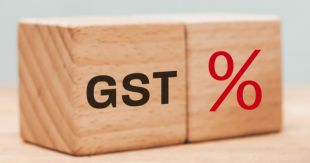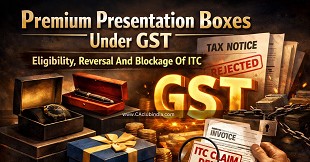GST Articles
From Production to Capacity: An Illustration-Rich Commentary on Rules 1 to 12 of the Chewing Tobacco, Jarda & Gutkha Packing Machines Rules, 2026
Raj JaggiAn in-depth analysis of the Chewing Tobacco, Jarda & Gutkha Packing Machines Rules, 2026, explaining the shift from actual production to capacity-based taxation, machine-centric assessment, deemed production, abatements and administrative certainty u/s 3A.
GST On Overseas Passenger Transport Services: When Performance Crosses Borders But Taxability Does Not
Raj JaggiExplore how GST law prioritises legal structure over geography in overseas car rental services, analysing place of supply, taxability, exports and reverse charge risks.
Motor Vehicle ITC: The Most Common Compliance Error & How to Get It Right
Hrishikesh H 30 January 2026 at 10:10Explore ITC on motor vehicles under GST with a detailed analysis of Section 17(5), AAR rulings, exceptions, employee transport and leasing scenarios.
Smart Handling Of GST Show Cause Notices: Why Section 75 Is The Backbone Of Fair Adjudication
Raj JaggiA GST Show Cause Notice is not a verdict but a test of professional maturity. Understand Sections 73, 74A and the crucial role of Section 75 in fair GST adjudication.
GST Twist From Feb 2026: Pay Tax On MRP Not Sale Price
Divisha 28 January 2026 at 16:23GST update effective 1 Feb 2026: GSTR-1 filing for tobacco goods shifts to MRP-based valuation. Learn tax calculation, formula, examples & reporting steps.
E-Invoice on Export Supplies with LUT under GST
Mitali 28 January 2026 at 12:17Confused on e-invoicing exports - Unlock GST e-invoicing rules for exports whether LUT filed or not.
Before Taxability Comes Identity: NDMC's Status As A Local Authority Under GST
Raj JaggiAn in-depth GST analysis of NDMC's status as a municipality and local authority, examining constitutional provisions, CGST definitions, exemptions and Supreme Court rulings.
GST Treatment on Rent 2026: Living or Doing Business - That One Question Decides GST on Rent
Mitali 24 January 2026 at 13:21GST on rent depends on property use. Residential rent for personal living is exempt, while commercial use attracts GST under FCM or RCM rules.
Premium Presentation Boxes Under GST: Eligibility, Reversal And Blockage Of ITC
Raj JaggiWhen Law Learns to Ignore the ShineEvery mature tax system is scrutinised not through intricate transactions but by seemingly straightforward items that challen..
Rule 86B Meets Rule 31D - Why Blanket ITC Assumptions No Longer Hold
Raj JaggiRule 86B under GST continues to matter as a revenue safeguard. Understand its intent, sectoral distortions, and the rationale behind the 2026 amendment.
Popular Articles
- TDS Rate Chart For Tax Year 2026-27: With Revised Section Codes in Challans
- Revised Return Due Date Extension
- Tax Deduction Rules for Employee Contributions From April 2026
- Comprehensive Guide to Statutory, Tax & Regulatory Compliances for Hotels
- Section 144C Time-Limit Finally Clarified: No More Litigation on Draft vs Final Assessment Deadlines
- Foreign Assets Disclosure Gets A Fresh Window Under Finance Bill, 2026: Part I
- Finance Bill 2026 - Clause 72: Compassion In Compensation, Clarity In Compliance And Technology In Taxation
- TDS and TCS: The New Shields and Arrows of the Taxpayer
Trending Online Classes
-
DT & Audit (Exam Oriented Fastrack Batch) - For May 26 Exams and onwards Full English
 CA Bhanwar Borana & CA Shubham Keswani
CA Bhanwar Borana & CA Shubham Keswani -
IDT LIVE Exam Oriented Batch | May 2026, Sept 2026 & Jan 2027
 CA Arpita Tulsyan
CA Arpita Tulsyan















 CAclubindia
CAclubindia
